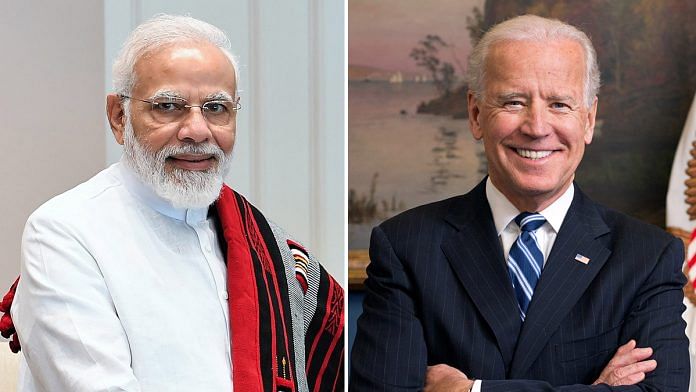New Delhi: Just like in war-torn Afghanistan and other global hotspots, the Biden administration has hit the ground running on the Quad and the Indo-Pacific, accelerating efforts to further elevate ties with India and forge stronger cooperation on dealing with China.
From pushing for the first summit of Quad leaders in less than two months of being sworn in, sending Secretary of Defense Lloyd Austin to New Delhi in one of the first overseas visits by a top cabinet official, to calling Modi ahead of world leaders and allies such as Xi, Netanyahu, Erdogan, and including India at the high table of Afghan peace talks, US President Joe Biden has left no room for doubt that bilateral and multilateral linkages with New Delhi are high on his priority list.
Some of that intent was put into words Tuesday when top Pentagon commander Admiral Phil Davidson told members of the powerful Senate Foreign Relations Committee during a Congressional hearing that the confrontation with China in Ladakh had opened India’s eyes to what cooperative effort with others might mean for their own defensive needs.
Davidson went on to list how the US had helped India deal with the military crisis along the LAC by providing information, equipment, cold-weather clothing and also mentioned how the two countries had been deepening maritime cooperation in recent years.
The virtual Quad summit will take place Friday even as Indian and Chinese troops continue to work on their disengagement in the icy Himalayas after their worst military face-off since the 1962 war. Washington Tuesday described the Quad as “a grouping with important friends and allies of the United States”.
This will be followed by Secretary Austin’s visit next week.
Also read: 3 recent phases that marked mistrust in India-China ties — ex-foreign secy Gokhale explains
‘Deepening defence ties’
Although Austin will visit Japan and South Korea before landing in India later next week, the fact that New Delhi is part of his itinerary that includes close friends Tokyo and Seoul is signal enough, analysts said.
“In India, Secretary Austin will meet with his counterpart, Minister of Defense Rajnath Singh, and other senior national security leaders to discuss deepening the US-India Major Defense Partnership and advancing cooperation between our countries for a free, prosperous and open Indo-Pacific and Western Indian Ocean Region,” a Defense Department statement said Wednesday.
The high-profile visit, analysts said, underlined the bipartisan support in Washington for strengthening defence ties with New Delhi.
While credit needs to be given to the Trump administration for taking the strategic equation in the India-US relationship to the next level by elevating New Delhi to the Strategic Trade Authorization Tier 1 status in 2018, they pointed out that it was President Obama’s administration that designated India as a ‘Major Defense Partner’ in June 2016.
That the Biden administration is also closely tracking the India-China disengagement in Ladakh was evident in Admiral Davidson’s prepared testimony to the Senate Armed Services Committee.
“The PLA has not yet withdrawn from several forward positions it seized following the initial clash, and the consequent escalation of tensions between the PRC and India has resulted in casualties on both sides,” he said.
“This large-scale PLA mobilisation — which is particularly notable considering the elevation, terrain, and distance involved — has stoked regional concerns that the PRC will increasingly use force to achieve desired outcomes.”
Also read: Covid challenge, economic crisis, climate change to be discussed during Quad — US
‘India should move fast’
Jayadeva Ranade, a China expert and a former Indian intelligence officer, said it is critical for India to “become serious” about the Quad.
“Yes, it is true that the Biden administration is pushing for more clarity and more substantive commitment from India when it comes to facing China,” he said. “We need to move faster now. China will have around 360 warships ready by 2025. So, this is serious. But India can never be an ally of the US, we can be good partners now that the defence agreements are in place.”
Lt Gen. Rakesh Sharma (retd), a Distinguished Fellow at the Centre for Land Warfare Studies (CLAWS) in New Delhi, and a former Corps Commander of the Indian Army’s 14 Corps in Ladakh, said that the Quad summit would not impact the India-China negotiations over disengagement.
“Even the other Quad members like Australia and Japan are not able to delink themselves from China when it comes to their economic ties with that country, so India participating in Quad Summit will not affect the disengagement process…as of now, Quad is more about cooperation in maritime security and climate change and not so much into territorial talks,” he said.
Also read: Days before first Quad summit, Japan PM Suga shares worries about China in call with Modi



